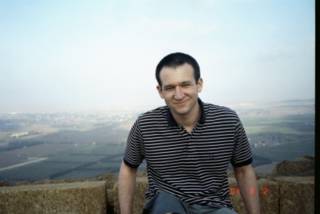New Popes, Old Ideas
Three things are going on which I find interesting. The first is the election of a new pope, Benedict XVI. The second is the proposed boycott of Israeli universities by the Association of University Teachers (AUT) in Great Britain. The third is the nomination of John Bolton for US Ambassador to the UN.The conclave of Cardinals chose Joseph Ratzinger, a German who has served for a quarter century as the head of the Congregation for the Doctrine of the Faith. In this position, Ratzinger served as an enforcer of theological Vatican decisions, essentially acting as John Paul II's right-hand man. The best way to understand what the job entails is to look at the office's old title, the Holy Inquisition. It is almost a necessity that whoever holds such a position hold the Catholic line, and thus, will be viewed as a conservative.
I was debriefed on Ratzinger by a former Catholic seminary student at the office and based on this debriefing, I have a somewhat more complete picture of how insiders may view the new Pope. Ratzinger is apparently the foremost Catholic philosopher of his time, the author of several books. This intellectual rigor is apparently attractive to many serious Catholics, and my source mentioned that if nothing else, Ratzinger was likely to be consistent.
Many people, particularly liberal laity Catholics, have criticized Ratzinger's election as a polarizing move by the Cardinals certain to further alienate the liberal elements of the Church's laity.
It strikes me, though, that the Cardinals understood what these liberals do not: the old-time religion of authority is growing. John Paul II's conservatism did not stop the Church from growing in leaps and bounds during his papacy.
Both Islam and Judaism are experiencing different phenomena, and both have much more at stake, in my view, than the Catholic Church does. Islam is also growing by leaps and bounds, and it is not the liberal wing of Islam that is accounting for this growth. It is the hardline fundamentalist element, those who favor imposition of Sharia law and get along poorly with people of other faiths. In Judaism, no sector is growing as quickly as the ultra-orthodox, and, particularly in Israel, this fact has major implications for the future of the state. Authority seems to rule the day here, and hardliners appear to be gaining ground.
The secular world is little different. The movement for boycotting the Jewish state, the latest manifestation of which is the effort by some in the AUT to boycott Haifa, Hebrew, and Bar Ilan Universities in Israel. This hardline position, discriminatory in nature, has solidified even as Israelis and Palestinians are moving back to the peace table. It is obvious to all those but the brainwashed that such an action would be counterproductive, because the universities are bastions of liberalism, because the Right in Israel will immediately use such a boycott to demonstrate how naive the left-wing university professors are, and because the move would vitiate every double standard argument ever made by the Zionists. Despite these obvious problems (not to mention the utter immorality of the bigotry such an action entails), the widespread condemnation by mainstreamers, and the moderation of both the Israeli government and the Palestinian Authority, the movement to boycott the Israeli academics appears to be growing. If successful, the AUT would effectively be requiring Israeli professors to take an anti-Zionist loyalty oath.
The Bush administration's nomination of hardline blowhard John Bolton for US Ambassador to the United Nations at a time where many, left, right, and center, are counselling an improvement of the working relationship between the US and UN is yet another example of a hardliner reacting to calls for compromise by staking out an even harder line. Predictably, this Rovian move by the Bush administration, forever playing to the base rather than the country, has been welcomed and applauded by conservatives, who have poo-pooed all of Bolton's shortcomings, including (and particularly distressful) dressing down of intelligence analysts who tried to restrain Bolton from lying in speech about Cuba's weapons capabilities.
Is the art of compromise lost? Has it simply been abandoned for winners-take-all-losers-be-damned systems? Religious, secular, governmental - no one seems to be immune.

